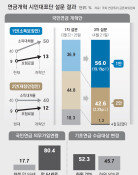Timing matters for the governments pension reform
Timing matters for the governments pension reform
Posted October. 22, 2014 15:11,
The presidential office and the ruling party disagree over when to pass a bill on the governments pension reform. In an unofficial high-level meeting of the ruling party, the government, and the presidential office at the prime ministers office in Samcheong-dong, Seoul, on Monday, the presidential office asked the ruling Saenuri Party to pass the bill within this year but the partys leadership wanted to delay passing the bill. It claimed that there is strong backlash from government employees and it also would take time to ask for cooperation from opposition parties. The ruling party had planned to pass the bill in the regular parliamentary session at the end of this year, but it now intends to postpone it to April next year.
The attempts to reform government employees pension were made in 1995, 2000 and 2009 but they all failed due to the strong backlash from government officials. A pension reform is such a sensitive issue that the labor union shows strong responses while opposing an open discussion from being held. Unless the administration pushes strongly for the reform, it cannot succeed. If it is delayed to April next year as the ruling party says, the reform would be highly unlikely to take place in the Park Geun-hye administration. Next year is the third year of President Parks term. Both ruling and opposition parties have to care about votes because there is only a year to go before the 2016 general elections. Even the ruling party might have different voices, let alone opposition parties.
Timing matters in reform. Addressing a hot potato issue such as reforming government employees pension should be done in the early part of an administration when the president has strong power. Twenty months have passed since President Parks inauguration but few achievements can be counted. It is partly due to some political reasons, but the Korean people doubt the administrations policy implementation ability. Reforming government employees pension was the presidents pledge during the campaign. Kim Moo-sung, the ruling partys leader, also said, The reform should be done by all means even if we might lose some votes.
Unpopular policies such as the reform would likely be put on the backburner next year. If the ruling party and the presidential office are not on the same page over important policy issues including the reform of government employees pension, they cannot win the peoples trust. To maintain the current pension system, 18.4 trillion won (17.4 billion dollars) of taxpayers money will be needed for the next five years. Amid reducing pension benefits for the general public, how long will the government dole out money to government employees from its coffer?







